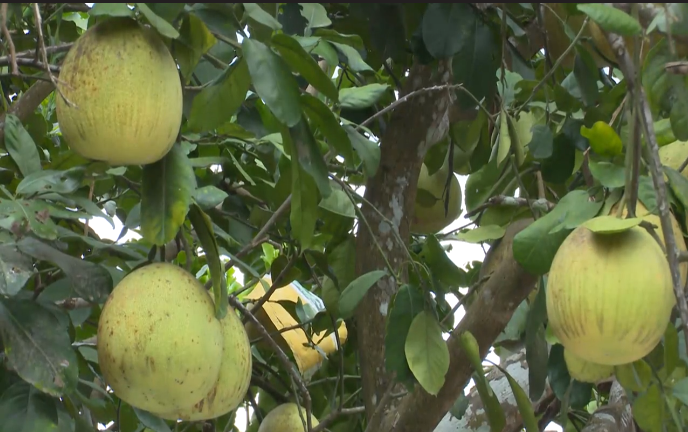
Thanh tra grapefruit in Nguyet Bieu village. Photo: Ngoc Ha
Shutting its eyes to the fact that Hanoi is already entering a cold spell, the Red River is too generous with wind. However, on the banks, we seem to travel back time into our childhood, freed from the cold. Laughter echoes everywhere. Once stepping through the gate to the flower garden, we seem to get a real ticket back to our carefree childhood and mischievous school life. In front of our eyes are endless beds of white marguerite daisies; a little further are verdant fields of yellow canola. Then roses, sunflowers, yellow daisies and buckwheat flowers from the Northwestern highlands - dozens of kinds of flowers, each like a puzzle piece mingling together to form a vast flowery jigsaw. If only one could have wings to fly along the river to behold the beauty of the flowers while inhaling the pungently aromatic scent of alluvium.
The riverside seems endless. The Red River flows ceaselessly, carrying loads of alluvium. Walking on the riverside alluvial plains, the feet can feel the smoothness of the underneath soil, which suddenly evokes an extremely tender feeling for the soil. For the sake of lush crops, the porous alluvial soil silently gives away the best of it, contained in each of the grain. Beams of dry honeycomb-yellow sunlight on a Hanoi afternoon stretch out seemingly with a view to providing warmth to the farmers of Nhat Tan working meticulously down below.
I wonder how many people have been here, passing on and taking over the work on this piece of land. The trace of soil is evident not only on their rough hands and bare mud-stained feet but also on their honest faces, benevolent smiles and sincere way of talking.
Newspapers flooded with photos of marguerite daisies, of street vendors' bikes loaded with flowers have attracted a steady flow of people to visit Hanoi. Once they set foot on the alluvial plains along the river, sniffing the scent of soil mingled in the wind, their hearts may recognize that it is the alluvium that underlies the bright color and the pure scent of the flowers. The chill of an early morning in the winter of Hanoi seems to creep into the bones. Sipping at my strong tea in a corner of an ancient Hanoi street, beholding the beauty of street corners filled with flowers, I realize that the elegance of ancient Hanoi is still evident on each of its small streets. The habit of loving flowers and buying flowers to arrange in a vase at home everyday is a beautiful trait of Hanoi people. In the hustle and bustle of Hanoi at dawn, I come across a trace of the old Hanoi thanks to the aroma of the hot teacup, the sweet scent of "xôi lạc", leaking through a multitude of layers keeping it warm. The dish has been skillfully steamed on a knitted pad to prevent the steam from falling down on the rice.
The bundle of "xoi lac", wrapped in two layers, the inner one - banana leaf, the outer one - a piece of newspaper. The aroma of roasted sesame brings back the memories of our mother's kitchen, lit by warm charcoal fire in the old days. The handful of such a simple dish suddenly has the power to dispel the winter in Hanoi.
Among the specialities of Hanoi, there are a lot of dishes deriving from the Red River water rice civilization, including those made from rice, glutinous rice, and beans, especially soybean and its famous final product - tofu.
Every river has its own source and flow, but its alluvium shares the same essence - the sweetness of the soil and human labor are present in its produce. Standing on the alluvial plains of the Red River is reminiscent of the Perfume River in Hue, of the fruit-laden gardens in Luong Quan, Nguyet Bieu, of Hen islet in the corn flowering season, of the tiny mussel, dwelling deep in the mud of the Perfume River, but having the sweet flavor of the whole Truong Son jungles.
The flavor of alluvium is a silent note of a river, as well as a silent note of a motherland.
By Xuan An